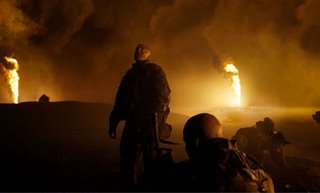A US Marine. According to some, a reference to the high and tight haircut and squared chin. Also, a reference to a Marine utility covers supposed resemblance to a mason jar lid. The far less common connotation is to the mentality of a US Marine, a reference to the necessity of the Marine to not be an individual, thinking entity but instead a jar ready to be filled with an order, command and most importantly, an idea.
This is one of several enduring themes communicated in the recently released Sam Mendes movie, Jarhead. The movie claims to not be anti-war but one can't help but connect with the frustration, the loss of a sense of self and humanity, expressed by the leads. If this isn't an anti-war message, what is it? We also have the omnipresent and unmistakable glorification of war by virtue of the focus being on the warriors travelled from distant lands to rain destruction not on the civilians missing fingers, toes, ears, arms, legs, the children killed. In this way all war films are pro-war. Jarhead is different. Not in that it refuses this formula; subtly, Jarhead perfects it.
There is no fighting. Instead, there is the long, anxious, fearful wait building up to what is psychologically and rhetorically billed as the mother of all battles. Like apocalypes now, Deer Hunter, Full Metal Jacket and other anti-war films, Jarhead succeeds through typical
 cinematic glorification in romanticizing the would be killers and at worst, we sympathetize with them and their plight of wanting to kill an "Iraqi motherfucker" and not being given the chance.
cinematic glorification in romanticizing the would be killers and at worst, we sympathetize with them and their plight of wanting to kill an "Iraqi motherfucker" and not being given the chance. I don't think an anti-war film can be made where the leads are of the aggressors. Jarhead is pro-war in as much as we are made to identify with the main characters. There is a reality of the psychological destruction waged on the soul and psyche of the warrior. But let's be honest, the horror of war is found where the victims lie. True anti-war films are about the victims, not the executioners.